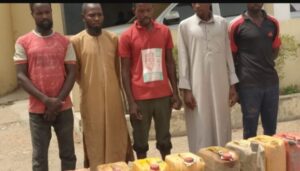There is a behind-the-scenes tug-of-war currently going on about the Presidential Amnesty Programme (PAP) among some Ijaw groups. At the middle of the fight is PAP’s Interim Coordinator, Milland Dikio, a retired Army Colonel. It is being alleged that he is compounding the deep-rooted mistrust in the Niger Delta, Nigeria’s main oil and gas region by sidelining some repentant militants in the affairs of PAP.
With the unfortunate development, a section of the restive circle is falling out with him. The development is likely to have adverse effect on the country’s economy. Perhaps, it is well known that the oil region has been a place of frustrated expectations. Unprecedented restiveness at times erupts in violence. Decades of neglect and conflict have fostered a siege mentality, especially among youths who feel they are condemned to a future without hope, and see conflict as a strategy to escape deprivation.
Persistent conflict, while in part a response to poor human development, has also entrenched it, serving as a consistent drag on the oil region’s economic performance and expectations for advancement. The sabotage of oil production hurts the economy through the loss of sorely needed foreign exchange to finance national development.
Blown pipelines interrupt the supply of crude to refineries and produce shortages that cause sudden spikes in oil prices. Hostage-taking is not only a stress on foreign captives, their families and the companies they work for, but also presents a challenge to international diplomacy and foreign direct investment.
But the disruption also has adverse effects on the local people, as ensuing violence threatens individuals and communities. Lives are lost, and investments drop along with the availability of jobs. The response to violence has at times meant further violence is unleashed randomly on unsuspecting communities or oil workers.
Whole villages have been destroyed and their populace displaced because of disputes that could have been amicably resolved. The human development implications extend to the harm done to the life chances of children unable to go to school and the further constraints on human and social capital.
There is a general concern that some people, particularly unscrupulous politicians and political organisations, benefit from violence, and that they sponsor some of the youth gangs in the region. Arms merchants along with police and military personnel have supplied weapons to various gangs, and the increased incidence of oil theft has been linked to the need for foreign exchange to purchase arms.
While turmoil in the area has many sources and motivations, the preeminent underlying cause is the historical failure of governance at all levels. Declining economic performance leading to rising unemployment or underemployment; the lack of access to basic necessities of life like water, shelter, food and clothing; discriminatory policies that deny access to positions of authority and prevent people from participating in shaping the rules that govern their lives—these all indicate that governance over time has fallen short.
Corruption aggravates feelings of being cheated, especially when the rulers live like kings amid extreme want. In spite of the substantial flow of oil money to state and local governments, many communities see no sign of government presence in terms of development projects. This tends to intensify a sense of hopelessness, and mistrust that for the most aggrieved people leads to a call to arms.
Among the Niger Delta’s many problems, some of the most serious relate to environmental sustainability, which is fundamental to people’s well-being and development. Wide-ranging and usually destructive environmental changes have stemmed from oil and gas extraction, industrialisation and urbanisation.
Oil spills and gas flares in particular have destroyed natural resources central to local livelihoods. The alienation of people from their land and resources has led to the inefficient use of remaining resources and poor or inequitable land-use practices.
Local people have ended up frustrated both with the oil and multinational companies doing business in the region, and the government agencies that fail to rigorously regulate them. For years, local people have expected protection from successive federal and state governments that never arrived.
Attempts to fight back have compounded the environmental challenges in some cases, such as when the sabotage of oil pipelines results in more oil pollution, in addition to the frequent loss of lives and property.
Economically, the Niger Delta region is heavily invested in the oil and gas industry, but despite the fact that this is a non-renewable resource, economic diversification has been limited. Local people often cannot tap directly into oil industry benefits, including employment, because they lack skills or capital resources or both.
The once rich agricultural enterprises developed in the mid-20th century, which generated substantial foreign exchange earnings in the 1960s and 1970s, have mostly been abandoned. For 85 per cent of the population, informal enterprises are the primary source of a livelihood, but these are characterized by low productivity and wages.
Not surprisingly, women, who face a double marginalization due to gender, are particularly active in this sector. A majority of the people lacks information and technical abilities, and unemployment and underemployment rates are high.
The tension in the region has prompted some local people, especially youths, to prefer quick and profitable gains from conflict over longer term—and frequently unavailable—investments in education and training.
While many development agencies and private sector organisations, including oil companies, have sought to transform the region socially and economically, analyses of poverty and human development paint a dismal picture.
The region’s Human Development Index (HDI) score, a measure of well-being encompassing the longevity of life, knowledge and a decent standard of living, remains at a low value of 0.564 (with 1 being the highest score).
While these ratings put the Niger Delta at a slightly higher level than Nigeria’s overall HDI of 0.453, the area rates far below countries or regions with similar oil and gas resources. For example, the HDI for Saudi Arabia in 2000 stood at 0.800, while in 2003 the United Arab Emirates, Kuwait, Libya, Venezuela and Indonesia achieved scores of 0.849, 0.844, 0.799, 0.772 and 0.697, respectively.
A further disaggregation of the HDI score at the local government level in the Niger Delta clearly shows that regional and state scores mask inequalities in human development among oil-producing communities.
In spite of the efforts of oil companies to enhance the well-being of the communities where they operate through several development initiatives, particularly in social infrastructure, there is still wide disparity in the performances of local government areas.
A report by United Nations Development Programme (UNDP) discovers that most of the best performing local government areas on the HDI are the urban ones, while the majority of the poorly performing ones are those based in rural areas.
The local government areas without oil facilities appear to fare better on the poverty index than those with oil facilities; an indication of unequal distribution of oil revenues. The poor outcomes of development interventions of oil companies are, to some extent, due to lack of a systematic link to government development plans.
The oil region’s appalling human development situation cannot be completely captured by the HDI, as some essential issues in the region are not reflected in the computation of the index, such as the dire state of infrastructure.
The lack of data also distorts the analyses of poverty and human development paint a dismal picture, particularly when the region is compared with other oil-producing regions of the world. Nevertheless, available data point to the fact that the region is not faring well.
The poor marks suggest the delta may struggle to achieve the MDGs. It is only close in one area—school enrolments—and was not able to meet the other goals by the target date of 2015, or even anytime soon.
Behind its poor performance on human development is a complex brew of economic, social, political and environmental factors. Social instability, poor local governance, competition for economic resources and environmental degradation have taken a toll.
The general neglect of infrastructure, often rationalised by the difficulty of the delta’s terrain, has worsened people’s access to fundamental services such as electricity, safe drinking water, roads and health facilities that are taken for granted in many other parts of Nigeria.
Other elements include the negative impacts of the oil industry, a constricted land area, a delicately balanced environment and extreme economic deprivation.
Now, some armed youths in league with some aggrieved repentant militants want President Muhammadu Buhari to fire the Amnesty Programme chief, Dikio, immediately.
At the centre of the current unease in the oil region is an alleged return of N26 billion unspent Amnesty Fund to the Buhari administration by Dikio.
The money, according to the boiling militants was meant to offset the backlog owed contractors of the Amnesty Programme from 2014 to date. Dikio did not seem to do that, his alleged action is fueling fresh anger in the area.
Leader of the Third Phase of the repentant militants, General Ebi John, is warning that for Dikio to return the alleged N26 billion without paying contractors being owed will spell doom for the Federal Government.
According to him, ‘’late last year, President Muhammadu Buhari listened to our agitation and released billions of naira to the amnesty office to offset debts the office is owing vendors/contractors. But the interim coordinator who refused to pay the contractors, returned N26 billion as unspent fund to the federal government.
“On December 31, by 12am the portal used for payment closed and every kobo was returned back to the Federal Ministry of Finance without paying the contractors. The Interim Coordinator has started failing.
‘’Take for instance, the amnesty office does not train or empower delegates directly. But do so through the services of vendors/contractors. Now, most of these vendors/contractors borrowed money from the banks to execute their jobs because the amnesty office had stopped mobilization of any kind to vendors/ contractors.
“I can remember vividly that on December 17 in Arogbo in Ondo State, when the amnesty boss met with critical stakeholders drawn from First, Second, and Third phases of the Programme in the presence of General Boyloaf, High Chief Shoot-At-Sight, former IYC President, Dr. Chris Ekiyor, and others, he said that payment of debts owned vendors/contractors have started with those from 2014.
“As at Wednesday, 90% of the vendors/contractors were not paid. The disadvantage of returning the N26 billion is that thousands of ex-agitators who were waiting for their vendors to call them for training and empowerment in January 2021 are now stranded at home.
‘’The last part of the amnesty programme is training and empowerment of ex-agitators but it is not working. As ex-militants, we will not allow what is happening to Niger Delta Development Commission to happen to the Amnesty programme.”
Continuing, he said the amnesty deal involves disarmament and demobilisation of militants, rehabilitation and integration of ex-militants, and infrastructural development of the oil region.
‘’The Amnesty Programme also has the mandate of improving the human capital development of the Niger Delta region’’, General John adds.
Before now, UNDP has been warning that without peace, there will be no human development in the Niger Delta. As such, allowing the issue of the alleged return of N26 billion to boil over will escalate conflicts in the oil region to a point where the balance could tip towards outright warfare, which will be even more difficult to control given the unresolved national question in Nigeria.
Before retiring from the Nigerian Army in July 2004, Dikio commanded the Nigerian Contingent of Military and Police UN Observers in Angola. As Commanding Officer NIBATT 37 ECOMOG, Sierra Leone he was responsible for securing the major land approaches into Freetown, the Child Soldiers rehabilitation Camp in Orogu and Disarmament Camp in Newton.
He successfully carried out the special mission to dislodge Sam Bockerie, a notorious Revolutionary United Front Rebel considered inimical to the success of the Sierra Leone peace process without casualties.
In order to stop cross border rebel activities that had the potential to drag Guinea and Liberia into war, he led an Advance team in November 2000 that conducted an extensive reconnaissance mission throughout the length of the Guinea-Liberia borders in his capacity as the Military Adviser/Principal Programme Officer Peacekeeping at ECOWAS Executive Commission.
With a rich experience, it was expected that he should know that brokering peace in the turbulent creeks of the Niger Delta can only be achieved through a closely coordinated domestic strategy that addresses oil theft, money laundering and illegal arms.
International cooperation can help create a climate where this strategy will have a realistic chance of success. Unfortunately, the specific activities of a regional blueprint for peace does not seem to be encompassing peace-building initiatives; promoting the rule of law and easier access to justice; ensuring the integrity of the electoral process and other leadership selection mechanisms; promoting equitable distribution of the benefits from mineral resources; encouraging demilitarization (including disarmament); and ensuring effective law enforcement and policing.
What is happening at the moment is that the educated Ijaw youths are plotting to take control of the Amnesty Programme, claiming that most of the ex-militants are illiterates. Dikio seems to be playing along, and the ‘’illiterate’’ armed youths are aware of the nasty development.
It has always been expected that agencies that are keen of resolving the Niger Delta crisis should first, identified key issues with a view to addressing the conflict and security situation. The priority still remains, disarming and demobilising the festering militia groups.
Since assuming office last August, Dikio is yet to initiate programmes to foster a climate of peace, and promoting a cross-cultural awareness campaigns to reorient people towards human coexistence, harmony and mutual partnerships.
In alliance with the damaged Niger Delta Development Commission, they should have been embarking on rehabilitation efforts, reaching out to youths who have become largely unemployable or unwilling to develop themselves.
NDDC and the Amnesty Programme have the capacity of making the peoples of the oil region live valued and dignified lives, in peace and free from poverty. Rather than pursue a peace agenda that includes education, easier access to justice and a more equitable distribution of resources, they have compounded the resource curse of the region.
It is equally tragic that since 1999, the oil region is yet to embark on a realistic and mutually agreed long-term development agenda that can be rigorously monitored by stakeholders. Strategies to improve the quality of governance is not focusing on enhanced service delivery, checks on corruption and the engagement of people in shaping policies for their well-being.
Meanwhile, PAP explained on Friday that it returned some N26 billion unspent funds to the treasury in compliance to extant financial guidelines. Nneotaobase Egbe, Special Adviser on Media to Dikio said so in a statement.
According to him, the Treasury Single Account (TSA) which was developed to check corruption in government Ministries, Departments and Agencies applies across the board and is not restricted to PAP.
The clarification is coming amidst concerns of huge obligations including monthly stipends to beneficiaries of the Amnesty, and those awaiting training mobilisation, empowerment and contractors’ liabilities.
Egbe notes that the last quarter funds remittance came a few days to the terminal date for the 2020 fiscal year and the PAP was only able to disburse part of it as the payment portal shut the unspent N26 billion
“The PAP hereby states emphatically that it is true that N26 billion in the account was mopped up on December 31, 2020 as a part of the Federal government wide financial process. It is not true that PAP was targeted or singled out as has been rumoured on social media. It has thus become necessary to state the facts as follows:
“In order to reduce the debts owed several contractors since 2014, a payment plan that was sequential was initiated. It started with the oldest debt in consideration of vendors’ interest payments on loans secured from banks to execute their contracts. A total of 104 such debts based on our records of the level of job completion have been paid as of December 31, 2020.
“Other verified payments could not be made before December 31, 2020 because PAP’s funds for September/October allocation and November/December allocation were received on the 28th of December 2020 and 29th December 2020, respectively.
“In compliance with the Federal Government’s anti-corruption and extant financial regulations, our system was only able to disburse a portion of these funds before the Federal Government’s Treasury Single Account was automatically shut down”, he said.
He further stated that the Accountant General of the Federal was promptly notified of the need to rollover the funds to meet the obligation of the PAP to beneficiaries and contractors, pointing out that it had informed the Minister of Finance has been notified on the need to release the funds to enable PAP to promptly meet its financial obligations contractors handling training and empowerment contracts.
Adding, he said, “PAP is committed to prudently dispensing its financial obligations based on extant financial regulations. We therefore urge our ex-agitators/delegates and communities and contractors to remain calm. We are sure that these issues would be resolved speedily, and PAP would receive exclusive rollover of funds going forward to avoid this type of situation in the future. PAP remains committed to restoring payment of stipends on the 25th of every month once the bumps are cleared.”







